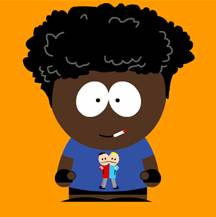A Generation of Emotionally Stunted Retards
Or How I Learned to Stop Worrying and Love the Emoticon ;^)
KG, a co-worker in my office came up to me the other day and said that we belonged to the 13th Generation. Not being quite sure what she meant, I asked and she informed me that, traditionally, the 13th Generation is the generation of people who've been neglected, set adrift, and left to fend for themselves...
I've been thinking about this ever since...
And at this point, before I get to the navel gazing, I'll admit that a huge part of me wants to repudiate this, because the "problems" facing our generation are as old as the hills. (I can imagine those of the older set wanting to reach through their monitors to throttle me and exhort "why do you morons think that it's all about you?")
I just think that what we call our problems are just part of the course of human life, and that, as we get closer to our 40s, 50s and beyond (with hope), our ability to deal with these things increases. Call me an optimist.
Having said that...The number of people in my age range and younger that I see struggling from one day to the next is pretty...overwhelming? Astounding? Let's just say that it's noticeable.
What happened to us? Back in the 90s, we were all "Hey, fucko! We rule, and our shit don't stink, bitch!"
Then, we got older, and our ironic veneer no longer worked in our favor. Here we are, all of a sudden. We may have a direction in life, or not; we may have a spouse, or not; we may be materially wealthy, or not.
What we all seem to have in common, however, is a dread for dealing with the day to day life stuff. As Mamet once said about life, it's that "if it isn't one thing, then it is most decidedly another...*"
Let me be clear, I'm not talking about the mundane stuff, the "I need toilet paper, what am I eating, where is my cat" stuff (though for a lot of friends, this can also be a major stressor). I'm talking about feelings, I'm talking about emotions, I'm talking about that twinge of anxiety you feel when someone says or does something confrontational.
I'm not saying that everyone has these problems, I realize I'm casting a wide net regarding our generation. I know plenty of people who don't have any of these problems, who don't think twice before taking action when faced with a challenging situation.
However, these numbers are seemingly dwarfed by those who freeze.
--------
I recently joined an online community, and in the course of participating, I ended up getting involved in some heavy political discussions, especially during the recent Katrina SNAFU.
During this past weekend, I was at a gathering of members and we talked about how people get turned off when they read political threads that start off with a rational, dialectical, point by point presentation of an idea, which would be more than a page long.
They reason that it's too long, and who wants to spend time reading something like that?
I can buy that...Here's what I don't buy: Each person who held this position said that they'd be more willing to talk those issues face to face, preferrably over beer.
This notion is noble, at heart. But not exactly realistic.
We're talking about an online community here, for one thing. It is much easier for our generation to sit behind the distancing safety of semi-anonymity and one's monitor, and trade meaningless barbs back and forth. Much better than actually having an exchange of ideas.
And it's not like any of us are likely to strike up a similar conversation with a random stranger.
(At least not in Seattle.)
My friend AK was the first to point out our generation's propensity to deflect or willfully ignore most public displays of emotion, whether artistic, fictionalized or authentic.
AK also said something that I've heard bouncing around a lot over the past few years, that the more we communicate via the internet, the quicker our person to person social interactions unravel.
(I realize the inherent irony of stating this on a blog.)
The argument against this is that people were saying the same thing about TV in the first 20 years since it was introduced. To which I say, let's look at our parents and how disconnected they can be, now look at us. Finally, look at any of the children you may know.
It seems like the shorter the attention span, the higher the need for instant gratification, the shorter the temper and the higher the likelihood for negative social behavior.
Sure, some of this can be corrected with upbringing, but when little Johnny is better able to communicate via Instant Messenger or texting on his cell phone, yet doesn't know how to talk to his teacher, or his elders, or his parents, as is increasingly happening...Well...
Are these two things (emotional coldness and increased online activity) related? Personally, I say yes. And the more I see human behavior becoming increasingly distant, the more convinced I am of it.
Which doesn't mean anything, as I doubt this current trend is going to go anywhere.
*"...you fucking asshole."



4 Comments:
I tend to find my online communication waxes and wanes with inverse proportion to my "real" communication; but I kind of have to pose a rhetorical "chicken or egg" question to myself--and to you--on that front. Since most of my friendships came about through theatre, when I'm not doing a show--and at times like now, when I'm not even sure what, if any, relationship I have with the art form--I'm sometimes at a loss for social contact, and will try to make up for that difference online, especially since there are numerous online "communities" wherein my obsessions with music, cinema and alternative spirituality are seen as positive (which, generally speaking, doesn't seem to be the case elsewhere).
That said, I do think there are certain rigours of human contact that I'm avoiding by communicating primarily online: I tend to get drunk on the freedom to go off on whatever tangents I stumble upon without fear of interruption; and I'm saved from the burden of having to come up with ideas quickly, instead of letting them brew, and letting the language in which I express them work itself out.
lyhound: What I'm talking about is not so much the actual online activity. For pete's sake, I've been involved with it since the late 90s (Yahoo! Quote Game represent!), and, god knows, the meese list has been a part of my life for about six years now.
So, it ain't that.
It's how person-to-person contact tends to deteriorate when online activity is used as a substitute for real human contact. If, like a certain roommate of mine, any and all social interactions scare you to the point of hermit-dom, and all of your contact with outside people consists of emailing ebay, calling food orders in, etc., it is no wonder that you're a social misfit.
I don't know if that point makes any sense.
Oh, sure. I see your point. But I still think it ties in to what I'm saying in that there are sometimes reasons (good or bad, and some outlined above) that online contact seems preferable to real human contact. Unfortunately for those predisposed to social misfit-dom, having the option of never leaving your house is pretty much a guarantee that you'll take advantage of said option.
Fortunately, I'm not overly prone to online shopping because I like record stores, sifting through clothes at the thrift shop, etc. As such, my online activity is limited to holding forth on the topic of the moment, and there's still hope for real social connection with flesh-and-blood individuals (or so I'd like to think).
My word verification jumble is "xrodei", which I can't help but want to pronounce as "ex-roadie", which is funny and sad.
ALright, I'm saying this before reading the other comments, but I'm a burnout and will forget what I want to say too quickly.
First, TBO, I think your take on the 90s shows that this thing you are observing as a difference is more situational than you give it credit for. I left school in the early 90s with a huge debt, left a state that was seriously economically depressed, and came here to enter an industry that was tanking in Seattle. I didn't at that point have much in the way of artistic ambition, just professional, and the situation was fucked. There was no need for the only skills I had, and I had a huge economic burden already. And my family had always talked of college as the answer, as the key for success. I was worse off than my folks or even most of my friends older siblings, and felt dispossesed. Much more so than now, and I'm still a mess.
As for this second thing, I don't think it is a one-to-one causal relationship. The emotional detachment has plenty of other causes as well - even the fact that we have just passed the point where the majority of the population is urban instead of rural. There is a different level of trust and communication in cities, necessarily. So, the increasingly mediated nature of communication is a factor, but I'm not willing to brand it cause.
Consider this - networked kids are more comfortable with the mediation, have always had their experience mediated, and as a result their brains are wired to negotiate the mediation better. They understand the intercommunication differently, judge their relationships differently. So, maybe it isn't that the older folks are more connected but merely differently connected, and our belief that they are less connected tells us more about our discomfort with the technology than it does the inherent qualities of the technology.
I'm stealing quite a bit here from Douglas Rushkoff's Children of Chaos, which rocked, like all his stuff.
Post a Comment
<< Home